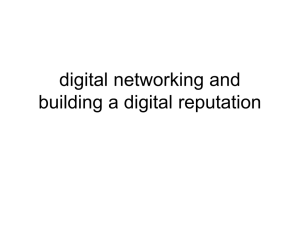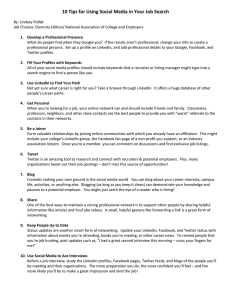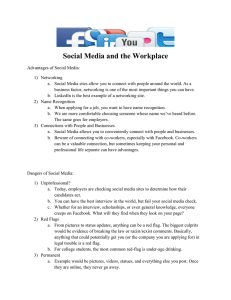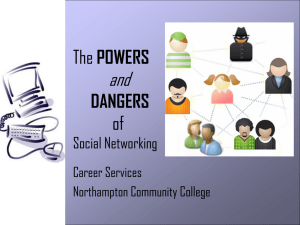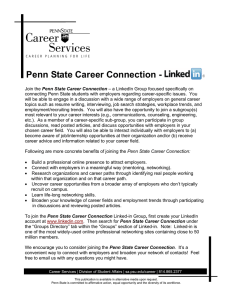Social networking sites are doing much more
advertisement
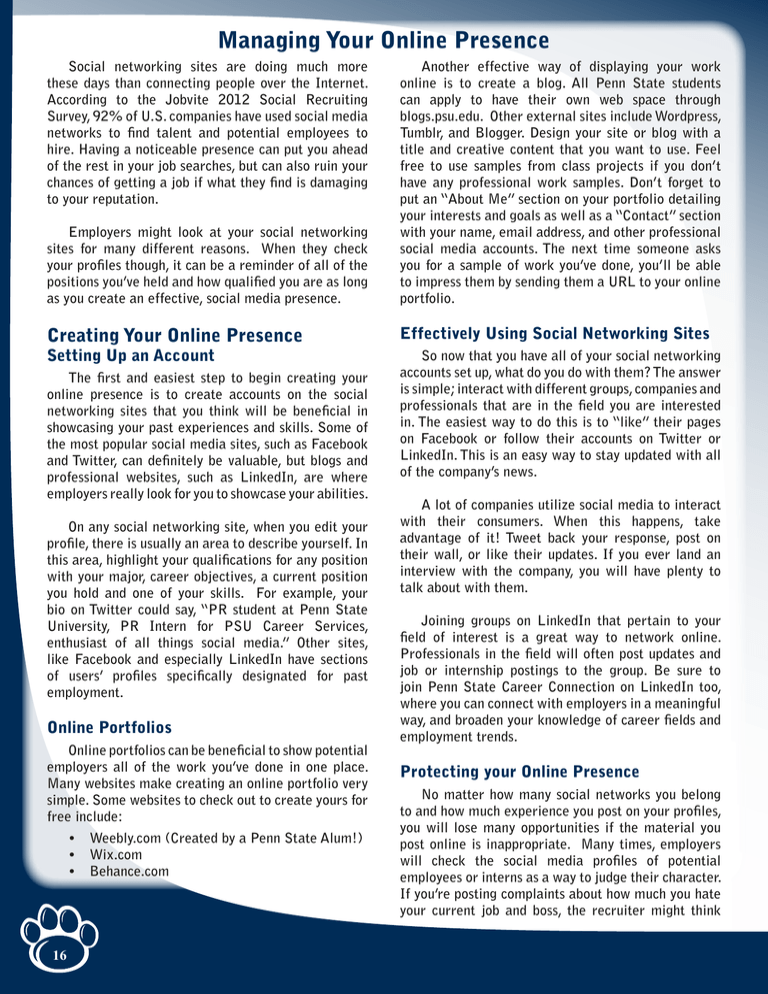
Managing Your Online Presence Social networking sites are doing much more these days than connecting people over the Internet. According to the Jobvite 2012 Social Recruiting Survey, 92% of U.S. companies have used social media networks to find talent and potential employees to hire. Having a noticeable presence can put you ahead of the rest in your job searches, but can also ruin your chances of getting a job if what they find is damaging to your reputation. Employers might look at your social networking sites for many different reasons. When they check your profiles though, it can be a reminder of all of the positions you’ve held and how qualified you are as long as you create an effective, social media presence. Another effective way of displaying your work online is to create a blog. All Penn State students can apply to have their own web space through blogs.psu.edu. Other external sites include Wordpress, Tumblr, and Blogger. Design your site or blog with a title and creative content that you want to use. Feel free to use samples from class projects if you don’t have any professional work samples. Don’t forget to put an “About Me” section on your portfolio detailing your interests and goals as well as a “Contact” section with your name, email address, and other professional social media accounts. The next time someone asks you for a sample of work you’ve done, you’ll be able to impress them by sending them a URL to your online portfolio. Creating Your Online Presence Effectively Using Social Networking Sites Setting Up an Account The first and easiest step to begin creating your online presence is to create accounts on the social networking sites that you think will be beneficial in showcasing your past experiences and skills. Some of the most popular social media sites, such as Facebook and Twitter, can definitely be valuable, but blogs and professional websites, such as LinkedIn, are where employers really look for you to showcase your abilities. On any social networking site, when you edit your profile, there is usually an area to describe yourself. In this area, highlight your qualifications for any position with your major, career objectives, a current position you hold and one of your skills. For example, your bio on Twitter could say, “PR student at Penn State University, PR Intern for PSU Career Services, enthusiast of all things social media.” Other sites, like Facebook and especially LinkedIn have sections of users’ profiles specifically designated for past employment. Online Portfolios Online portfolios can be beneficial to show potential employers all of the work you’ve done in one place. Many websites make creating an online portfolio very simple. Some websites to check out to create yours for free include: • Weebly.com (Created by a Penn State Alum!) •Wix.com •Behance.com 16 So now that you have all of your social networking accounts set up, what do you do with them? The answer is simple; interact with different groups, companies and professionals that are in the field you are interested in. The easiest way to do this is to “like” their pages on Facebook or follow their accounts on Twitter or LinkedIn. This is an easy way to stay updated with all of the company’s news. A lot of companies utilize social media to interact with their consumers. When this happens, take advantage of it! Tweet back your response, post on their wall, or like their updates. If you ever land an interview with the company, you will have plenty to talk about with them. Joining groups on LinkedIn that pertain to your field of interest is a great way to network online. Professionals in the field will often post updates and job or internship postings to the group. Be sure to join Penn State Career Connection on LinkedIn too, where you can connect with employers in a meaningful way, and broaden your knowledge of career fields and employment trends. Protecting your Online Presence No matter how many social networks you belong to and how much experience you post on your profiles, you will lose many opportunities if the material you post online is inappropriate. Many times, employers will check the social media profiles of potential employees or interns as a way to judge their character. If you’re posting complaints about how much you hate your current job and boss, the recruiter might think you’ll do the same once you work for their company, too. Once you do have a solid online presence, it’s important to keep your reputation positive at all times. Some things to think about before your next post: •If you wouldn’t say it to your Grandmother or want her to see it, don’t post it. •Don’t say anything online you wouldn’t say in an interview or mind if it was brought up in an interview. Privacy Settings The key to protecting your online profiles is to understand how to use each site’s privacy settings. Spend sufficient time on each site learning how to best protect yourself from people outside your immediate circle. Sites are always changing and that includes the privacy settings. Check often to make sure that when you search yourself as a stranger, you like what you see. •Assume that anything you post will be on the internet forever for everyone to see. You should also do an online search of your name often to see what comes up. If you don’t like what you find, then start to make the changes necessary on your social media sites. Consider setting up alerts to notify you when anything about you is posted online. Always scan your pictures, posts and conversations that you have with people on every social media platform to make sure the right messages are being sent about your character. If you ever doubt anything- delete it or un-tag yourself. Your friends may like your photos; but a future employer may not. Photo by Patrick Mansell Consider all of your social media accounts and complete the following checklist. All of my profile pictures are appropriate: Yes No All of the appropriate privacy settings are turned on: Yes No I would not be embarrassed if a recruiter looked at my profiles: Yes No When I search for my name online, no personal information or inappropriate content is brought up: Yes No I know each and every one of my Facebook friends who have access to my profile: Yes No My friends do not have any inappropriate pictures of me posted online: Yes No My friends have not posted anything inappropriate on my profiles: Yes No 17
